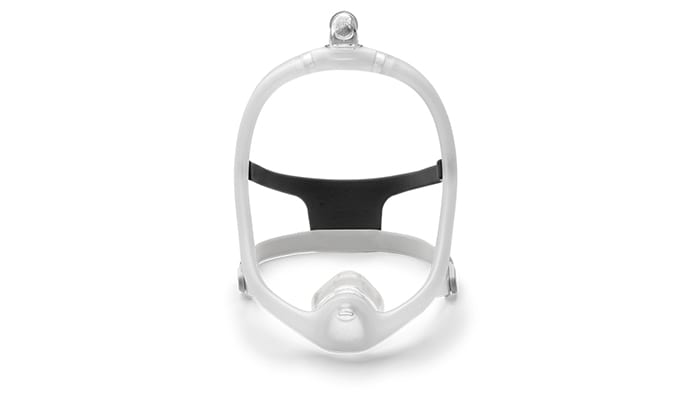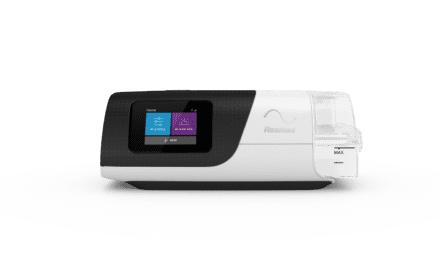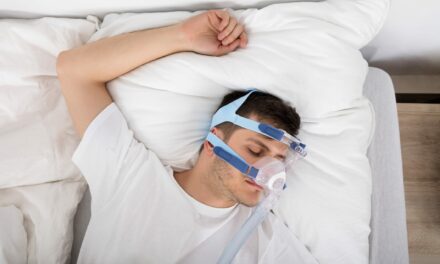Following warnings that CPAP masks with magnetic closures may interfere with certain medical devices and implants, sleep physicians have questions. Here’s what to know.
By Alyx Arnett
Magnetic closures on CPAP masks, introduced to simplify the attachment and detachment of headgear to the frame, have helped many users with dexterity or vision impairments. However, a recall of over 18 million CPAP masks with magnets by Philips Respironics, coupled with a recent safety notice from ResMed, spotlights potential safety issues with these interfaces.
According to Philips, ResMed, and the US Food and Drug Administration (FDA), CPAP masks with magnetic headgear clips can potentially interfere with certain medical devices and implants—including pacemakers, implantable cardioverter defibrillators, neurostimulators, metallic splinters in the eye, and aneurysm clips—causing injuries or death. The interference can happen to people who use the masks and to people near a person using the mask.
Injury Reports
Through Aug 30, 2022, Philips reported 14 serious injuries related to the use of its recalled masks (and no deaths): Amara View Full Face Mask, DreamWisp Nasal Mask, DreamWear Full Face Mask, Wisp and Wisp Youth Nasal Mask, and Therapy Mask 3100 NC/SP. These included pacemaker interference, pacemaker failure, a need for shunt adjustment, resetting of automatic implantable cardioverter defibrillator, arrhythmia, cognitive changes, headaches, change in heart rate, convulsions, and irregular blood pressure. These Philips masks were first distributed in 2015.

Following Philips’ September 2022 recall, ResMed began discussions with regulators to ensure it was up to date with recommendations around the use of magnets, according to Dawn Haake, chief quality and regulatory affairs officer at ResMed.
Subsequently, ResMed issued a safety notice in November 2023 for its masks with magnets due to contraindications in and near people with certain medical devices and implants. The affected masks are AirFit F20, AirFit F20 for Her, AirTouch F20, AirTouch F20 for Her, AirFit F30, AirFit F30i, AirFit N10, AirFit N10 for Her, AirFit N20, AirFIt N20 for Her, AirTouch N20, AirTouch N20 for Her, and AirFit F20 NV.
“A contraindication is generally established when the risk of using that product outweighs its benefits, especially when comparable products are available without similar risks,” says Haake. “While we continually monitor safety signals across our industry, it was essential to better understand and thoroughly investigate these risks before making product changes.”
ResMed, which distributed “tens of millions” of masks with magnets from 2014 to 2023, according to its safety notice, reported five serious injuries and no deaths. The company recommends that contraindicated patients replace their mask containing magnets with an alternative mask without magnets.

The company is making non-magnetic masks available to mask providers for replacement for contraindicated patients. The company continues researching and developing new products for patients, “especially those with special needs,” according to Haake.
Philips and ResMed say their masks with magnets are safe to use according to the updated instructions and labeling.
“Based on Philips Respironics’ analysis, this means that, in most patient populations, approximately 95% of the patients should be able to continue using the mask as they have been,” says Mario Fante, senior press officer at Philips Global Press Office. Fante says Philips has informed customers and patients on the impact of magnets used in masks and how to mitigate such risks.
Key Takeaway: No deaths have been reported from CPAP masks with magnets. Reports of injuries include pacemaker failure and a need for shunt adjustment. Patients without contraindications can continue to use their masks with magnets, according to Philips and ResMed.
FDA Recommendations
Following Philips’ recall, the FDA issued recommendations for health care providers, advising they tell patients to stop using recalled masks and switch to non-magnetic masks if they or someone near them when wearing the mask has a contraindication.
Physicians should not prescribe recalled masks to contraindicated patients and should ask about other people near them who may be at risk, according to the recommendations.
An FDA spokesperson says the agency is evaluating the safety of magnets in masks or similar interfaces from other manufacturers. “The FDA intends to alert these manufacturers if appropriate and take necessary steps to address any issues that may be identified,” the spokesperson says in a statement predating ResMed’s safety notice.
For replacement mask options, the spokesperson says the FDA recommends searching for FDA-cleared masks for CPAP/BiPAP machines in the 510(k) premarket notification database by entering “BZD” in the product code box and “mask” in the device name box.
According to Philips and ResMed, magnetic clips with a field strength of less than 400 mT are used in the indicated masks, complying with the guidelines from the International Commission of Non-Ionizing Radiation Protection, as well as the ISO 14117:2019-09 standard, for the use of magnetic elements in the proximity of implanted medical devices.
Philips and ResMed now recommend masks with magnets be kept six inches away from medical implants and other devices that can be impacted by the magnetic fields.
Key Takeaway: The FDA is evaluating magnets in other CPAP masks and interfaces that could potentially impact patient safety.
Updating CPAP Mask Prescribing Protocols
The safety warnings have led some sleep centers to update their protocols to ensure contraindicated patients aren’t prescribed masks with magnets.
Laura Linley, RPSGT, FAAST, executive vice president of operations at Advanced Sleep Management, says the company’s sleep centers added a pre-sleep study question inquiring whether the patient or bed partner has a contraindicated device. If they do, a mask without magnetic closures is used. This is documented in the technician’s summary for the physician to reference when ordering from the durable medical equipment (DME) company.
As for replacing masks for contraindicated patients, Linley says Philips offered a non-magnet closure alternative but notes that it has been out of stock and is an additional cost. The center has instead replaced magnetic masks with alternatives from other manufacturers like Fisher & Paykel, which doesn’t sell masks with magnets.
At the company’s heart and vascular hospitals, masks with magnets are banned entirely.
Chris Abad, product manager at Fisher & Paykel, says the company offers options suitable for patients with disabilities, such as the full-face Evora Full mask, which uses ergonomically designed clips made with co-molded plastic materials. The shape, size, and feel of the clips make it easy for patients to connect and disconnect without the need for magnets, says Abad.
Additionally, Fisher & Paykel’s VisiBlue color-cued parts help patients identify different mask parts and aid in assembly and disassembly while cleaning the masks. Features like “stop-tabs” on the headgear minimize the number of parts that can come apart while disassembling the mask for cleaning.
Key Takeaway: Sleep centers must now note magnet contraindications in patients’ health records and select alternatives for contraindicated patients with dexterity challenges and disabilities.
Mask Fitting Software Adapts
AR Medical Technologies, maker of remote mask fitting software MaskFit AR, responded to Philips’ recall by incorporating a magnet contraindication question into its software. An accompanying disclaimer provides a list of devices and implants for which magnet use is contraindicated.
The algorithm generates a recommended mask list based on the responses to this question and others. “We’re just going to eliminate any masks with magnets if they answer in the affirmative,” says Wade West, vice president of sales and business development at AR Medical Technologies.
West says the addition of the question has been well-received. “When we’ve been doing demos, they’ll say, ‘OK, good, I see the magnet question here.’ There’s a certain percent of providers and DMEs that are going, ‘Hey, this is important to us.’”
MaskFit AR also alerts patients who use masks subject to recalls and safety notices. The software enables health care providers to filter for specific masks and contact the respective patients. Providers can then send patients new scan links. If patients indicate a contraindication in their response, MaskFit AR updates the mask recommendations accordingly and facilitates ordering a suitable replacement.
Key Takeaway: Mask fitting software MaskFit AR incorporates a question to determine whether a patient can be matched to CPAP masks with magnets.
Published Studies Testing Magnet Interactions
Recent studies have explored the potential risks of magnetic CPAP mask interactions.
A 2019 case series described two patients with cardiac implanted electronic devices who had magnet response events that correlated with the nightly use of their CPAP masks. Investigators reproduced a magnet response event by positioning a CPAP mask over the patient’s pulse generator site. The investigators concluded that masks with magnetic clips should be avoided in patients with cardiac implanted electronic devices.1
Chad Ruoff, MD, a sleep medicine specialist at Mayo Clinic, and co-investigators conducted a study in 2022. “Although we advise all patients with implanted device to avoid use of masks with magnets, select patients refuse to stop using masks with magnets regardless of our policy,” the authors write.2
The investigators retrospectively reviewed 10 patients who were referred for a permanent pacemaker/implanted cardioverter-defibrillator interrogation to test whether a mask with magnets interacted with the medical device when on the patient’s face and when the magnetic area of the mask was placed directly over the patient’s medical device.2
No interactions were detected during simulated normal use, but one interaction was documented with direct contact—a finding the investigators called “concerning.” “It is not uncommon for patients to remove a mask during the night while sleeping,” the authors write. “This preliminary data, along with the published case series, calls for further research and increased awareness of this potential interaction for both sleep and cardiac health care providers.”2
Ruoff and co-investigators from Mayo Clinic performed a subsequent study in 2023 to further evaluate interactions.3
Patients with cardiac implanted electronic devices who used masks with magnets were recruited from the researchers’ sleep clinic to undergo a safety visit at a pacemaker clinic. The investigators tested whether the magnets interacted with the implanted device at home during normal use, in the clinic during simulated normal use, and with direct contact.3
Of 13 patients, one wearing a full face mask (ResMed AirFit F30) had a magnet response event with direct contact, but no interactions were identified during normal or simulated normal use.3
Investigators also tested the magnetic field strength of six magnetic masks with a gaussmeter.
The magnetic field strength of the masks increased the closer the mask got to the implanted devices, from 0.4 mT at the mask manufacturer’s then-recommended two-inch distance from an implanted medical device to 291 mT during direct contact.3
The researchers concluded that a magnetic CPAP mask may interact with a cardiac implantable electronic device if placed directly over it. “Until additional studies are conducted to better document the risks and benefits of [magnetic] masks, we recommend discouraging patients with cardiac implantable electronic devices from using any [magnetic] mask,” the researchers write.3
Key Takeaway: Several studies have also established the potential of CPAP masks with magnets to interact with medical devices, though some only found interactions when the magnets were placed directly over the medical devices.
How the Magnet Contraindications Are Impacting Patients
The safety concerns, coupled with earlier Philips recalls of certain PAP devices due to health risks related to possible degradation of their sound abatement foam, have led to a decline in patient confidence, says Monica P. Mallampalli, PhD, executive director of the patient advocacy group Alliance of Sleep Apnea Partners (ASAP).
“Patients who need this important treatment are afraid to use their machines and now masks,” she says.
Fueling patient frustration are a lack of clear direction, proper timeline for replacements, and miscommunication, she says. “Information coming out of companies can be complex and technical, and it is not always clear what the difference is between a recall versus a safety notice. That lack of clarity can cause more confusion and panic.”
ASAP aims to provide patients with “plain-language answers” to their questions. “In the case of the ResMed’s safety notice, ASAP was quick to send practical information out to our patient community. We appreciate ResMed’s willingness to inform us of the safety notice and the information that patients need,” says Mallampalli.
Mallampalli emphasizes the need for clear, direct communication between manufacturers and patient advocacy groups to ensure patients are informed quickly and clearly.
Looking forward, Mallampalli advocates for FDA-mandated policies that implement a tracking system or central registry for all DME-distributed sleep apnea products, streamlining patient tracking in case of recalls. Additionally, she calls for an established process to efficiently triage patients during recalls or safety notices.
Key Takeaway: Technical information can cause “confusion and panic” in patients, who are unclear about how recalls and safety notices impact them, according to a patient advocacy representative.
References
- Schwartz Y, Wasserlauf J, Sahakian AV, et al. Inappropriate activation of pacemaker magnet response mode by CPAP masks. Pacing Clin Electrophysiol. 2019;42(8):1158-61.
- Ruoff C, Tashman YS, Miller B, et al. 0789 Mask magnets may interact with pacemakers and implantable cardioverter-defibrillators. Sleep. 2022 June 1;(45)1:A342-3.
- Ruoff CM, Tashman YS, Cheema KPK, et al. Interaction of positive airway pressure mask magnets with cardiac implantable electronic devices. J Clin Sleep Med. 2023;19(5):941-6.
Illustration 25190704 © Palto | Dreamstime.com





